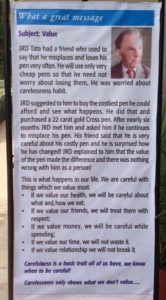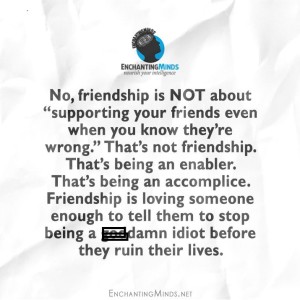 “JRD Tata had a friend who used to say that he misplaces and loses his pen very often. He will use only very cheap pens so that he need not worry about losing them. He was worried about carelessness habit. JRD suggested to him to buy the costliest pen he could afford and see what happens.
“JRD Tata had a friend who used to say that he misplaces and loses his pen very often. He will use only very cheap pens so that he need not worry about losing them. He was worried about carelessness habit. JRD suggested to him to buy the costliest pen he could afford and see what happens.
He did that and purchased a 22 carat gold Cross pen. After nearly six months JRD met him and asked him if he continues to misplace his pen. His friend said that he is very careful about his costly pen and he is surprised how he has changed! JRD explained to him that the value of the pen made the difference and there was nothing wrong with him as a person!
This is what happens in our life.We are careful with things which we value most.
If we value our health, we will be careful about what and how we eat;
if we value our friends, we will treat them with respect;
if we value money, we will be careful while spending;
if we value our time, we will not waste it.
if we value relationship we will not break it.
Carefulness is a basic trait all of us have,we know when to be careful! Carelessness only shows what we don’t value…… ”
———–
I found this picture in a post and thought it was well done. It made me think about all of the time I’ve spent making sure tools and such always got put back where I got them from.
Had you thought of the definition of “careful” in this manner? Probably not.
I know part of this was conditioned into me from my Father. He spent his days working on iron ore mining equipment. Tools were very important. I would get a good lecture every time I didn’t get things back where they belonged. At the time, the only real lesson that I learned from this was that it helps a job/project go smoother if tools are put back so when working you know where they are.
I’d wager that you can understand this idea from having lost – misplaced – your keys a few times. The frustration and wasted time are worse than not knowing where they are. This gets us started on developing habits, some call “rituals”, to help keep things running smoothly. These habits also illustrate the point in the story here. The more valuable the item, the more careful we are with managing it. Here’s where the twist comes in, though. These carefulness habits aren’t only for you and your stuff!
Looking at what working with my Father’s tools, it did teach me that the tools were valuable to him. By treating them as he dictated…asked…it taught me carefulness of someone else’s feelings. The loss of a tool caused frustration and pain. That is NOT something that I wanted to cause my Father. he deserved more respect than that. I know I wasn’t very good and I didn’t try hard enough, so I’m grateful that he forgave me and kept helping me.
 This carefulness is illustrated in the last point of the picture. “If we value relationship we will not break it.” The care taken to not hurt those you care about IS important. This does also carry over into supporting those who you have a relationship with. This is important as “careful” equates to “being full of care” and can be viewed poorly by those you care about. Hopefully, they will still love you even if they don’t like you for a while.
This carefulness is illustrated in the last point of the picture. “If we value relationship we will not break it.” The care taken to not hurt those you care about IS important. This does also carry over into supporting those who you have a relationship with. This is important as “careful” equates to “being full of care” and can be viewed poorly by those you care about. Hopefully, they will still love you even if they don’t like you for a while.
Sadly, carelessness happens more often. In simple little things like using turn signals or not stopping AT the line for traffic signals. Parking in two spaces (maybe that’s arrogant, too). It also shows in how much time you spend looking at your phone when you have people sitting next to you. How many others can you add without much thought?
“Carefulness is a basic trait all of us have, we know when to be careful.” It shows in the respect that you give. it shows in the discipline that you develop. It shows in the “service to others” than you provide.
![]()
